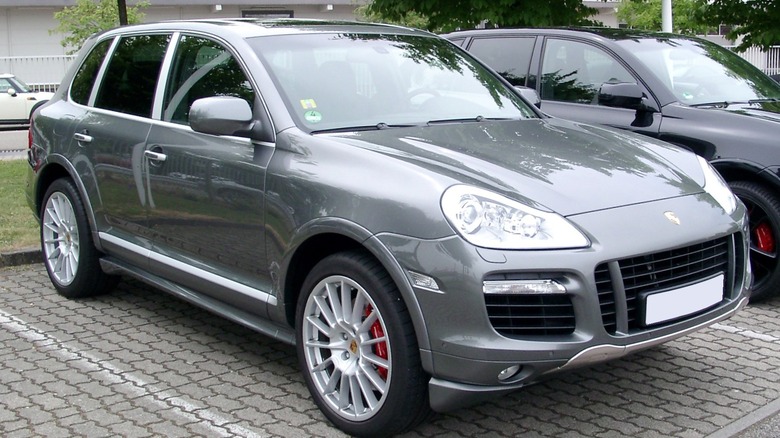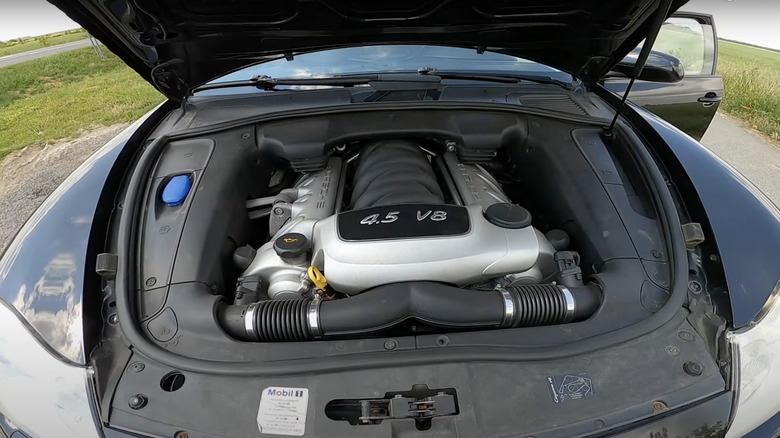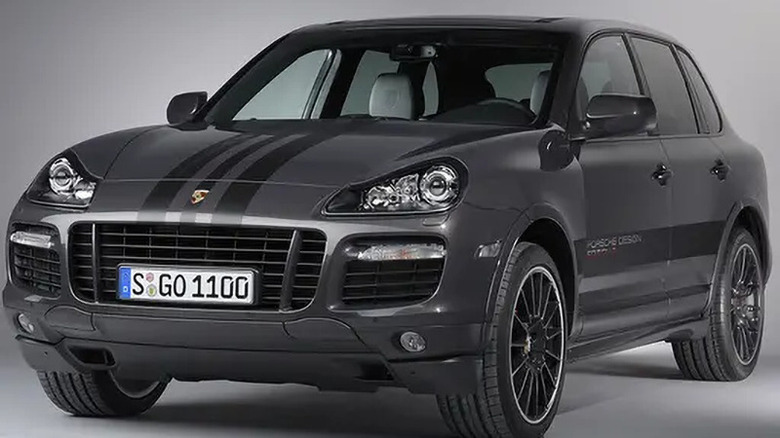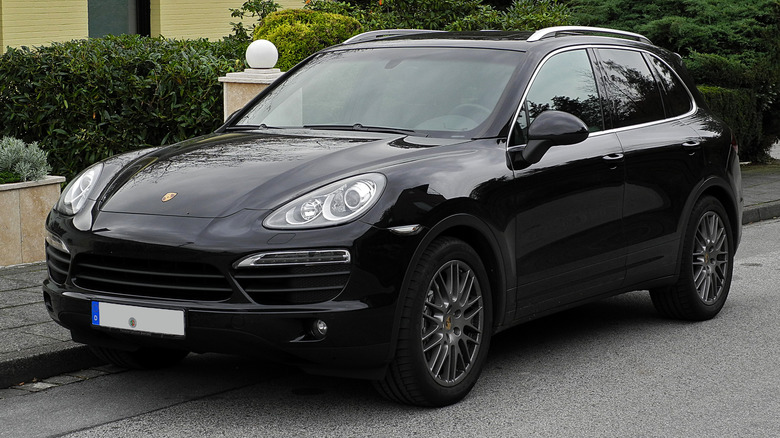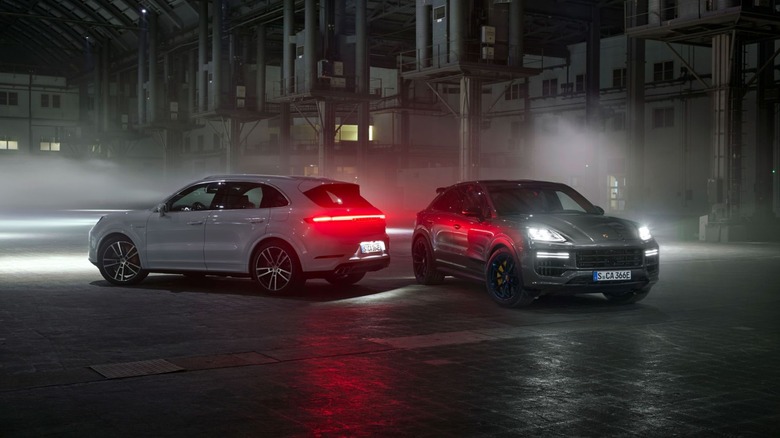5 Of The Most Powerful Engines Ever Put In A Porsche Cayenne
The Porsche Cayenne was introduced in 2002 as a third model to complement the 911 and Boxster. As stated on the manufacturer's website, Ferry Porsche claimed in 1989 that "if we build an off-road model according to our standards of quality, and it has a Porsche crest on the front, people will buy it." The Cayenne arrived in time to ride the SUV wave, and has evolved into a high-performance monster in its 20-plus years on the market.
Over that time, the Cayenne has gradually grown more powerful, as have off-road oriented machines from other manufacturers. For comparison's sake, consider the 2002 and 2024 Jeep Wranglers. The most powerful engine in the 2002 model was Jeep's famously reliable 4.0-liter inline six that produced 190 horsepower and 235 pound-feet of torque. For 2024, Jeep offered a range of Wrangler powerplant options that included a 470-horsepower, 392-cubic-inch V8 and the 375-horse 4xe hybrid drive system. The base engine in the debut Cayenne was a 3.2-liter V6 that produced 250 horsepower, but that engine wouldn't have budged some later versions of the Cayenne if they were hooked up tail-to-tail.
[Featured image by Rudolf Stricker via Wikimedia Commons| Cropped and scaled | CC-BY SA 3.0]
The first-gen Cayenne S had a V8 that produced up to 385 horsepower
One of those more powerful Cayennes actually shared a dealership lot with the V6-powered original. The first generation Cayenne S came with a 4.5-liter turbocharged V8 that cranked out 340 horsepower and 310 pound-feet of torque in the 2006 model. Porsche claimed a 0-60 time of 6.8 seconds, which was respectable for an SUV that weighed almost 4,950 pounds and could tow more than 7,700 pounds. After a 2007 facelift, the V8 in the Cayenne S gained 300 cubic centimeters of displacement, giving it a boost to 385 horsepower.
That shaved a half-second from its 0-60 time, making it two full seconds faster in that sprint than its V8-powered cousin, the Volkswagen Touareg. The 385-horsepower V8 stayed in the Cayenne S through the 2010 model year, by which point a couple even more potent engine options had been made available on the increasingly popular SUV.
The Cayenne GTS had a more powerful version of the 4.8-liter V8
In 2008, Porsche introduced the performance-oriented Cayenne GTS. It had a specially tuned version of the 4.8-liter V8 that produced 405 horsepower and a beefed-up chassis to handle the 20 extra horses. A limited edition of the Cayenne GTS badged as the Porsche Design Edition 3 came out in 2010, but only 1,000 of these were made.
This special Porsche was painted in a gray metallic and black color scheme, as shown above, and had special badging scattered around the interior and exterior. It could go from 0-100 kilometers per hour (62 mph) in 6.2 seconds and hit a top speed of 251 km/h (about 156 mph). A diesel version of the Cayenne was sold in Europe beginning in May of 2010, but that model's 3.0-liter V6 only produced 237 horsepower. There were still plenty of more powerful gas-driven powertrains for Cayenne owners to pick from, though, at that time and further down the road.
The second-generation Cayenne had as much as 550 horsepower on tap
The second-generation Cayenne that appeared for the 2011 model year had some enticing new offerings for eager Porsche customers. The 4.8-liter V8 in the Cayenne S was tuned to make 400 horsepower and 369 pound-feet of torque, but the twin turbochargers on the Turbo version boosted that to an even 500 horsepower. Buyers who went for the Turbo S got 550 horses from their V8s. Those three versions of the second-generation Cayenne came with a six-speed Tiptronic automatic gearbox.
If you wanted to row your own gears, you had to go for the base model, which paired a six-speed manual with a 3.6-liter V6 that made a mere 290 horsepower. The Cayenne Turbo S would set you back a minimum of $126,300, which equates to almost $164,000 in 2024 dollars. You certainly got what you paid for in terms of performance, though. The Turbo S weighed almost 6,800 pounds but could still hustle from 0-60 in just 4.7 seconds.
[Featured image by M 93 via Wikimedia Commons | Cropped and scaled | CC-BY SA 3.0 DE]
The 2022 Cayenne Turbo GT cracked the 600 HP barrier
Another generational update to the Cayenne came in 2019, when it was moved to a new platform that it shared with the Lamborghini Urus. Initially, the new Cayenne's engine options ranged from the base model's 335 horsepower, 3.0-liter V6 to a smattering of hybrid options that boosted that output significantly. The Cayenne E-Hybrid's electric motor increased the powertrain's capacity to 456 horsepower and 516 pound-feet of torque, and forced induction got the Cayenne Turbo up to 542 horses and 568 pound-feet.
In case that still wasn't enough, Porsche offered a couple of extra-special versions of the Cayenne Turbo with more letters on the badge and even more juice. The Turbo GT had a second turbocharger on its 4.4-liter V8 that helped boost output to 631 horsepower, but Porsche wasn't quite content to stop there. The hybrid powertrain in the Cayenne Turbo S E-Hybrid made a ridiculous 670 horsepower and 663 pound-feet of torque, enough to get this 6,600-pound dynamo from 0-60 in just 3.6 seconds. Thanks to the hybrid drive, this supercar-worthy performance didn't guzzle equally absurd amounts of gas. The 2022 Cayenne Turbo S E-Hybrid delivered 42 miles per gallon of combined fuel economy, and could take you up to 15 miles on battery power alone after three hours on a 240-volt charger.
[Featured image by Mr Walkr via Wikimedia Commons | Cropped and scaled | CC-BY SA 4.0]
The latest Cayenne hybrid powertrain is good for 728 horsepower
Porsche has continued to update the Cayenne throughout the current generation, including giving it a significant update for the 2024 model year. Among the big engine changes included in the mid-cycle Porsche Cayenne refresh were a major boost to the powertrain in the Cayenne Turbo S E-Hybrid. The 4.0-liter twin-turbo V8 cranks out 599 horsepower, and the electric motor helps that along to 729 horses in total. That's enough to get the Cayenne Turbo S E-Hybrid from 0-60 in 3.5 seconds, a time SlashGear's Chris Davies called "frankly ridiculous" in his glowing review of the 2024 Cayenne.
The beastliest Cayenne has suitable technological innovations to complement that remarkably potent engine. Porsche has increased the battery capacity to just under 26 kilowatt-hours, giving it a range of up to 82 kilometers (about 51 miles). There's an on-board 11-kilowatt charger that can fill that battery in as little as 2.5 hours, and adjustable air suspension so you can fine-tune the comfort and handling characteristics of your Cayenne. None of these capabilities come cheaply, though; the Cayenne Turbo S E-Hybrid starts at close to $160,000.
